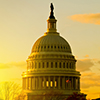 (June 30, 2025) - The vote-a-rama has begun! In Capitol Hill jargon, this means the United States Senate has entered the final phase of work on the budget reconciliation bill before a vote on final passage. The path over the weekend for the One Big Beautiful Bill Act to get to this point was a winding one, but one that has so far produced a majority vote to move it to the precipice of passage.
(June 30, 2025) - The vote-a-rama has begun! In Capitol Hill jargon, this means the United States Senate has entered the final phase of work on the budget reconciliation bill before a vote on final passage. The path over the weekend for the One Big Beautiful Bill Act to get to this point was a winding one, but one that has so far produced a majority vote to move it to the precipice of passage.
Entering the weekend, the OBBB did not have most Senators supporting it. All 47 Democrats oppose the bill in lock step, so Senate Majority Leader John Thune (R-SD) could only afford to lose 3 Republicans and still maintain a bare majority with Vice-President JD Vance breaking a 50-50 tie. There was more than enough Republican opposition to even begin debating the bill, much less holding an up or down vote on passage. Several GOP Senators like Rand Paul (R-KY), Ron Johnson (R-WI) and a group led by Rick Scott (R-FL) had concerns about the amount the bill would increase deficits. Others like Susan Collins (R-ME), Thom Tillis (R-NC) and Lisa Murkowski (R-AK) had vocal concerns about the bill's Medicaid cuts. Eventually, leadership was able to convince all but Paul, Johnson and Tillis to vote to start the debate.
GOP leadership's balancing act continues today. While the OBBB requires only a majority vote to pass the Senate because it is a budget reconciliation bill, any germane amendment must be voted on, and there are voluminous amounts of amendments the Senate is in the process of considering. Hence, the vote-a-rama, which will last well into the evening tonight before the final votes, one of which will occur on the so-called “wraparound” amendment inserting the bill's final negotiated text.
The final text concerning Medicaid, from what we currently know, poses challenges for all providers but tries to mitigate Kansas' challenges. In general, all non-expansion states are allowed to grandfather their current provider tax rates in perpetuity if they went into effect before the bill's enactment date. This implies Kansas' 6 percent rates for both Prospective Payment System hospitals, Critical Access Hospitals and Rural Emergency Hospitals will be grandfathered. When it comes to state-directed payments, the original Senate text would have grandfathered Kansas' PPS hospitals SDPs but not our CAH SDPs. The current version, which will be included in the wraparound amendment, will grandfather the CAH and REH SDPs. They are part of a preprint submitted, according to our understanding from discussions with the Kansas Department of Health and Environment to the Centers for Medicare & Medicaid Services today. The new language allows SDPs for rural hospitals to be grandfathered if a good faith effort was made by the bill's enactment date to get them approved. This huge change is due to the efforts of Senator Jerry Moran (R-KS) and his staffer Laura Titus, who both worked diligently day and night last week and over the weekend to ensure Kansas' entire provider tax program would be allowed to proceed. We are incredibly grateful for their tireless work on behalf of our state's Medicaid patients and providers.
However, certain harmful components of the original Senate language did survive. Non-expansion states will see their SDPs decrease to 110 percent of Medicare rates, stair stepping down from their current rates by 10 percent annually starting in 2028. Senator Moran was involved in pushing back the start of this wind down from 2027 in the original Senate language to 2028, allowing Kansas hospitals an additional year at the full SDP. We anticipate Kansas' SDP rates will be over 200 percent of Medicare by 2028, so this gradual percentage slide will see decreased hospital revenue distributed through the SDPs from then on.
To offset some cuts, the Senate intends to include in its wraparound amendment a $25 billion rural health transformation fund. This fund will spend $10 billion each in 2027 and 2028, $2 billion each in 2029 and 2030, and $1 billion in 2031 to improve rural health care. Hospitals are the principal beneficiaries of this fund. Each year, half of the fund will be split evenly between the states, and half will go by ratio to states with weightier rural health care delivery needs. We anticipate Kansas may receive above average in the program's ratioed funding formula.
The bill's path forward is all but certain. President Donald Trump wants it on his desk by Friday, July 4.To do this, the Senate must pass a bill acceptable to both 50 Republican senators as well as a majority of House members. Right now, it does not appear to meet that bar. However, negotiations are continuing, and most in Washington, D.C. expect Congress to pass a version of the OBBB soon. We encourage hospital to express their concern to our elected officials in Washington through our ongoing action alert.